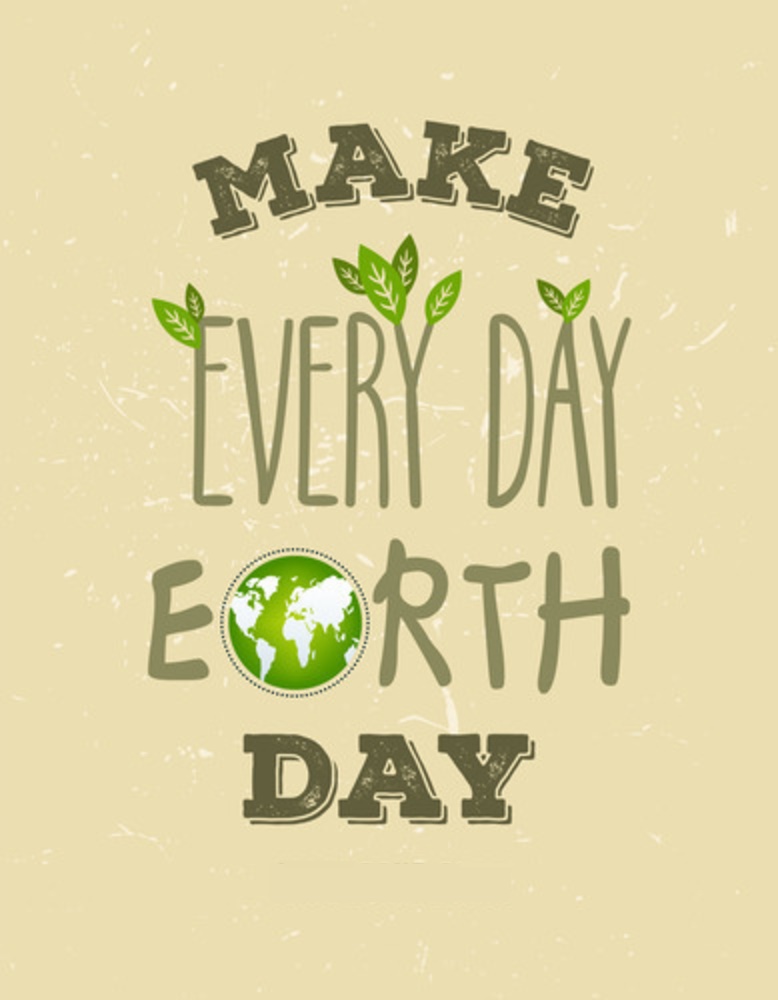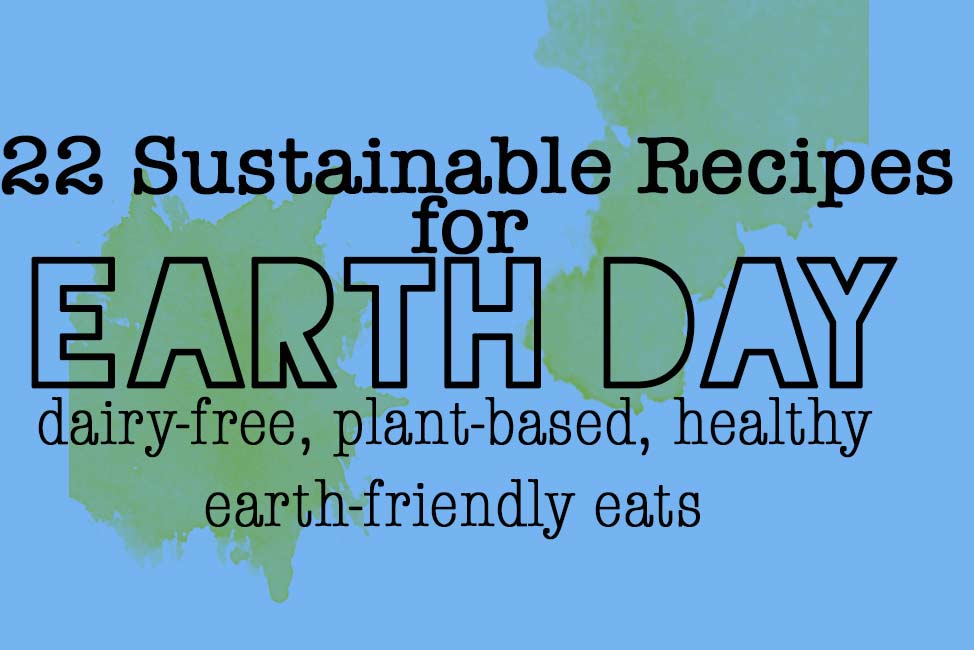In honor of Earth Day, I dug up several simple ideas to help all of us conserve throughout the year and even unearthed interesting findings about the role diet plays in our environmental impact.

Researchers at the University of Chicago found that our food choices may be just as important as what types of cars we drive, when it comes to global warming. It seems the average American diet requires an extra ton and a half of carbon dioxide equivalent when compared to a strict vegetarian diet (per year I believe). As noted by Natural Resources Defense Council giant livestock and dairy farms (with hundreds of thousands of pigs, chickens or cows) often generate the waste equivalent of a small city! But beyond going strictly vegan, here are 20 great Earth Day tips to easily be incorporate throughout the year:
- Replace light bulbs with low energy options, but don’t compromise your eye health. Look for full-spectrum CFL or LED light bulbs. Both are far more energy efficient than incandescent bulbs, and have a longer lifespan resulting in a lower cost per year. Better yet, pull up the shades and open the curtains. Natural midday light might be sufficient, and is better for your eyes and the planet!
- Install low-flow showerheads and faucets that will use half the water without decreasing performance.
- Turn down the hot water heater to 120ºF to reduce electricity use while cutting costs by as much as 50 percent!
- Water live houseplants with leftover drinking and cooking water whenever possible to reduce water consumption.
- Reduce the amount of on “standby power” you use by unplugging electronic gadgets you are not currently using. It may seem trivial, but they say even this little bit can add up to a big difference.
- Reuse pre-packaged tubs to freeze foods or to pack lunches to reduce the need for foil or plastic wrap. Some of the sturdier products can even survive many dishwasher runs (top rack only).
- Always pack along reuseable grocery shopping bags. I hope that the U.S. someday imposes the plastic bag fee that is found in so many countries throughout the world. If you don’t need a bag, tell the checker before they scan the items. They are quick to throw them in bags and will often throw away the bag (right in front of your eyes!) if you say you don’t need a bag after the fact.
- Cancel subscriptions to magazines or newspapers you don’t actually read, especially if you could read them online or even at the good old local library. Give old issues to friends, coworkers, nursing homes, doctors’ offices or libraries.
- Be your own transportation. We have a rule in our house, if it is within 1.5 miles (takes 30 minutes to walk or 12 minutes to jog) no cars allowed. If biking is feasible in the area, this expands to a 3 mile radius. Not only is this a friendly Earth Day practice, but it can add to your daily exercise!
- If possible, purchase foods in bulk. This isn’t a feasible option for severe food allergies, but if that isn’t a concern, check out the bulk section for cereals, flours, pastas, nuts, snacks, and more. You may not only save on packaging (stuffing a huge load into one of those jumbo plastic bags – or even bringing your own bags!), it will also likely be cheaper.
 Skip the produce bags or get reusable produce bags. Most fruits and veggies do not require a plastic bag, and may actually store better without one. Apples, oranges, bananas, peppers, zucchinis, you name it, don’t bag it. For the rest, there are all types of reusable produce bags to fit the job!
Skip the produce bags or get reusable produce bags. Most fruits and veggies do not require a plastic bag, and may actually store better without one. Apples, oranges, bananas, peppers, zucchinis, you name it, don’t bag it. For the rest, there are all types of reusable produce bags to fit the job!- If given the choice, pick local or domestic. If you have a farmers market nearby, head to it. Or, at the very least, stick to domestic produce at the grocers. Local producers use less energy to transport their goods than those grapes from Chile. Also, you are more likely to be buying produce that is less expensive and in season when you buy domestically.
- Go organic with the foods you eat the most of. This is an excellent option, where your budget permits, for fruit, veggies, meat, and grains. Pesticides, antibiotics, and hormones leach into our soil, our water supply, and of course, get ingested into our bodies!
- Turn off the lights! For some reason, I’m guilty of this one with the bathroom. If you are not in the room, turn it off. Getting light timers can be helpful if you can’t seem to shake this bad habit.
- Invest in an programmable heating/cooling thermostat. They are cheap (about $25) and easy to find. They allow you to set the temperature desired, and they regulate the heat. Our heating bill (in the mountains) dropped by quite a bit when we swapped out the old dial thermostat.
- Turn off your computer and monitor when they’re not in use. Computer screen savers and slide shows actually use a great deal of energy.
- Live in a “recycled” home. Buy or rent an existing home rather than buying in a new housing tract away from the city center. Not only will you likely save on gas (#9 becomes more feasible in concentrated areas!), but it avoids using up more resources to create another home.
- Keep things clean. Your appliances, from heating and cooling systems to refrigerators and dryers, will run less efficiently when build-up occurs in filters. Check “catch all” areas periodically and change your air filters on a regular schedule.
- Per the study above, consider incorporating a higher ratio of plant-based meals into your diet. And the small steps do count, including going dairy-free, increasing the plant ratio in meals, or enjoying a vegan day each week. See our post on the Best Earth Day Books for inspiration.
- And last but not least, recycle, recycle, recycle! Whenever possible, paper, aluminum, plastic, you name it!

 Skip the produce bags or get
Skip the produce bags or get 
4 Comments
One thing we all can do is to refuse, free items, straws, plastic bags.
Pingback: The Best Earth Day Books for Food Lovers - Go Dairy Free
These are some wonderful tips! Now that Earth Day has passed, it’s even more important to remember to do little things every day to help the planet. I especially loved numbers 4 and 8 on this list- these are great ways to be conscious of the water and paper that you are using!
Thanks Jessica! Agreed, it really needs to be something on our minds every day. I know I practice most of these things, but still have room for improvement daily!